-
More crude oil shipments by rail mean more accidents, but security measures lag
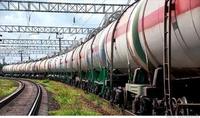
American rail companies have long operated under federal laws, making it difficult for local officials to gather information on cargo and how rail companies select their routes. An increase in the number of trains transporting crude oil, accompanied by a series of derailments and explosions, has highlighted the dangers of transporting hazardous substances by rail.In February, the Department of Transportation announced that railroads had voluntarily agreed to apply the same routing rules to oil trains that they currently apply to other hazardous materials. Critics say more needs to be done.
-
-
The Nigerian bus terminal attack: Public transport is a lucrative terror target
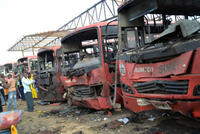
During the morning rush hour on 14 April, a car bomb containing an estimated 500-800 pounds of explosives blew up at the Nyanya District bus station on the outskirts of Abuja, Nigeria. Terrorism experts from the Mineta Transportation Institute (MTI) say we should note the significance of the attack for the rest of the world and put the facts into a larger perspective. Looking at all attacks on public surface transportation systems worldwide since 1970, the Abuja bombing was the twelfth most lethal attack. When comparing similar attack methods, it was the ninth most lethal attack.
-
-
Testing vibration caused by high-speed trains
New high-speed train lines are likely to be built as cities grow, and one problem planners have foreseen is vibrations in the ground caused by trains passing at speed. While these vibrations would probably be too small to damage buildings, they could disrupt the work of buildings such as a hospital by affecting sensitive equipment. Scientists have developed a new model to predict how much a new high-speed railway would shake the ground around it, and the effect this could have on those living near the line.
-
-
The benefits, challenges of self-driving cars
Self-driving vehicles offer the promise of significant benefits to society, but raise several policy challenges, including the need to update insurance liability regulations and privacy concerns such as who will control the data generated by this technology, according to a new RAND Corporation study. Researchers suggest that a guiding principle for policymaking is to encourage the technology when the facts indicate clear societal advantages over the capabilities of the average human driver.
-
-
Volgograd train station bombing highlights need for more rail security
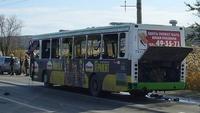
The recent train station bombing in Volgograd, Russia has focused attention on the vulnerabilities of rail infrastructure. According to a recently published report by IHS, purchases of explosives, weapons, and contraband (EWC) detection equipment at rail stations worldwide is expected to increase by 3.3 percent in 2014, and 8.8 percent in 2015.
-
-
Drive-by charging: Advancing wireless power transfer for vehicles
Researchers have developed new technology and techniques for transmitting power wirelessly from a stationary source to a mobile receiver — moving engineers closer to their goal of creating highway “stations” that can recharge electric vehicles wirelessly as the vehicles drive by.
-
-
Ann Arbor to offer residents networked, driverless cars by 2021
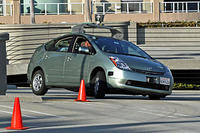
By 2021, Ann Arbor could become the first American city with a shared fleet of networked, driverless vehicles. This is the goal of the Mobility Transformation Center, a cross-campus University of Michigan initiative that also involves government and industry representatives.
-
-
Guardrails made safer with impact-absorbing Mediterranean tapeweed coating
Researchers have developed protective guardrails from residue of Posidonia oceanica,commonly known as Neptune Grass or Mediterranean tapeweed, in order to minimize the risk of injuries on the roads. The waste material is useful for coating the support posts of guard rails on roads so they can absorb and dissipate much of the kinetic energy if a collision occurs, preventing lacerations and amputations in cases in which a human body hits the support post.
-
-
Threats to transportation, other key infrastructure
Effective and efficient transportation plays a crucial role not only in the everyday lives of citizens, but also in ensuring the on-going economic well-being of communities and countries. People are able to get to work on time, goods are transported in a cost-effective manner, and energy is used as efficiently as possible. This is why disruption to transport, whether intentional or not, can cause such damage. As public transport is by its nature open and accessible to everyone, it is susceptible to terrorist attack, as seen all too clearly in the 2005 London bombings and the coordinated attack on four commuter trains in Madrid in 2004.
-
-
U.K. nuclear disaster exercise reveals worrisome lapses in emergency response
Up to six times a year, U.K. nuclear weapons are transported in heavily guarded convoys between production facilities in Aldermaston and Burghfield in Berkshire, where the nuclear bombs are manufactured, and the Royal Naval Armaments Depot at Coulport on Loch Long in Argyll. The trips are required because scientists must regularly examine the 200 Trident missile warheads in order to make sure they are operationally reliable and properly maintained. Every three years, the U.K. Ministry of Defense (MoD) conducts a drill aiming to test how various agencies respond to an accident involving the convoy carrying the nuclear warheads. An internal report on the last drill notes many problems in the response to the simulated accident, including five-hour wait for weapons experts, confusion over radiation monitoring, and ambulance crews refusing to take contamination victims to hospitals.
-
-
Canada considered deporting train terror suspect – but he was stateless
Raed Jaser, who is accused of planning an “al Qaeda supported” bomb attack aiming to derail a Canadian passenger train, was arrested nine years ago in Toronto and was facing deportation because he had a criminal record. Jaser is a Palestinian who grew up in the UAE. The UAE never gave his family a UAE citizenship, and they refused to take him back. The Canadian authorities say his case is not unique.
-
-
Experts: security of U.S. mass transit system must be tightened
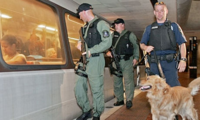
Counterterrorism experts are arguing that security on America’s mass transit lines must be tightened in light of the foiled plot to attack a Toronto passenger train. The plan to attack Canada’s transit system highlights security holes in America’s commuter system, and the challenges involved in securing this vast system.
-
-
Blast-resilient carriages to reduce impact of a terrorist attack on trains, metros
Engineers have developed a blast-resilient carriages which are better able to withstand a terrorist attack and ultimately save lives. The engineers have e focused on two key areas — containing the impact of the blast and reducing debris — the main cause of death and injury in an explosion and the key obstacle for emergency services trying to gain access to injured passengers.
-
-
The potential for self-driving cars in the U.K.
Researchers explored what it would take for driverless vehicles to become commonplace on U.K. roads; they highlight the potential benefits of self-driving cars, such as increased road safety and less traffic, but stress that a range of barriers need to be overcome before people buy them en masse
-
-
Students writing their own tickets
Four students at the University of New South Wales say they have cracked the secret algorithm used in Sydney’s public transportation system, which will allow them to print their own tickets
-
- All
- Regional
- Water
- Biometrics
- Borders/Immig
- Business
- Cybersecurity
- Detection
- Disasters
- Government
- Infrastructure
- International
- Public health
- Public Safety
- Communication interoperabillity
- Emergency services
- Emergency medical services
- Fire
- First response
- IEDs
- Law Enforcement
- Law Enforcement Technology
- Military technology
- Nonlethal weapons
- Nuclear weapons
- Personal protection equipment
- Police
- Notification /alert systems
- Situational awareness
- Weapons systems
- Sci-Tech
- Sector Reports
- Surveillance
- Transportation
Advertising & Marketing: advertise@newswirepubs.com
Editorial: editor@newswirepubs.com
General: info@newswirepubs.com
2010-2011 © News Wire Publications, LLC News Wire Publications, LLC
220 Old Country Road | Suite 200 | Mineola | New York | 11501
Permissions and Policies
Editorial: editor@newswirepubs.com
General: info@newswirepubs.com
2010-2011 © News Wire Publications, LLC News Wire Publications, LLC
220 Old Country Road | Suite 200 | Mineola | New York | 11501
Permissions and Policies
